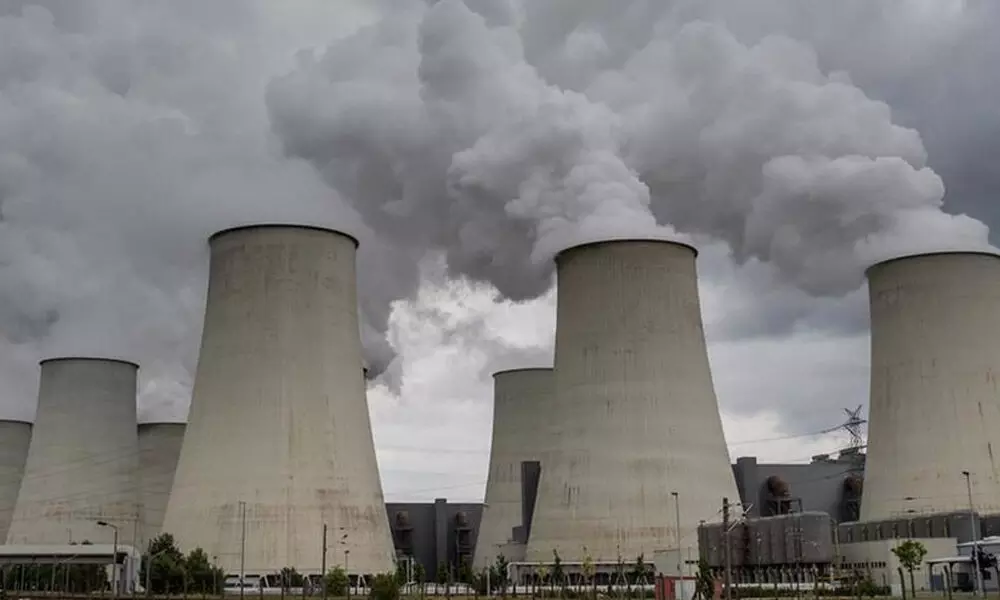Fossil fuel looms large on climate change talks

Fossil fuel looms large on climate change talks
There was near derision at times that countries like the United States, the UK and others are calling for fossil fuel use to ramp down in the long term but also pleading for more oil to bring down prices for consumers. Without energy security, countries will lose the means to tackle climate change, argue fossil fuel producers
Dubai: A flurry of summits this week across Dubai addressed the threat of climate change, or at least acknowledged that a pivot away from fossil fuels toward cleaner sources of power is needed to keep temperatures from rising.
The glaring fault lines, however, lie on when and how to achieve this. For fossil fuel producers, like the United Arab Emirates, which hosted the gatherings, more investments, not less, are needed in oil and gas. "We definitely at this time need to include all available resources," UAE Minister of Energy, Suhail al-Mazrouei, said at an energy forum in Dubai. "We cannot ignore or say we are going to abandon certain production. It's just not the right time, whatever reason you have," he said, adding that doing so would make prices too high for millions around the world.
It was a drumbeat echoed throughout the week in Dubai, reflecting the prominent voice fossil fuel producers are seeking to have in the global climate change conversation. It rang out at the Atlantic Council Global Energy Forum, the World Government Summit and a UAE-sponsored climate week in partnership with the United Nations.
OPEC Secretary-General Mohammad Sanusi Barkindo said that in the upcoming UN climate talks, known as COP27, in Egypt and next year's COP28 in the UAE, producers can address issues around "inclusiveness to ensure no sector is left behind, to address the issue of investment in the industry and to reassess the conversation." Barkindo said limiting global temperature rise to no more than 1.5 degrees C (2.7 degrees F) and the role of oil and gas "are not mutually exclusive."
That amount of warming compared to pre-industrial times is a benchmark and scientists say warming beyond it will expose people worldwide to far more extremes. To drive home the argument, proponents of more fossil fuel investments pointed repeatedly to current high oil and gas prices as reminders of the global demand for oil.
There was near derision at times that countries like the United States, the UK and others are calling for fossil fuel use to ramp down in the long term but also pleading for more oil to bring down prices for consumers. The United Nations Intergovernmental Panel on Climate Change and other international bodies have said that to address climate change there should not be new investments in fossil fuel infrastructure and that the fuels, which are mostly responsible for climate change, must phase out over time.
That was reiterated in a 350-page report this week by The International Renewable Energy Agency that said the world must take "radical action" by investing USD 5.7 trillion each year through 2030 to shift away from fossil fuels. IRENA, which happens to be headquartered in the UAE capital of Abu Dhabi, said investments of $700 billion should be diverted away from the fossil fuel sector each year.
"The energy transition is far from being on track and anything short of radical action in the coming years will diminish, even eliminate, chances to meet our climate goals," said Francesco La Camera, the director-general of IRENA, when the report came out. OPEC, weighted by Saudi Arabia, projects that more oil will be needed through 2040 and beyond, particularly in Asia. Brent crude stands at $105 a barrel, the highest in eight years.
The prices are not only good for the oil-driven economies of Saudi Arabia and the UAE, but also Russia, helping Moscow offset some of the pain from US-led sanctions related to the war in Ukraine. "Look at what is happening today. Who's talking about climate change now? Who's talking about attending to energy security, first and foremost?," Saudi Arabia's Energy Minister Prince Abdulaziz bin Salman said in suggestive but careful remarks at the World Government Summit in Dubai. Without energy security, countries will lose the means to tackle climate change, he said.
Recent data show that despite rapid growth in renewable energy, total emissions of the gases that allow the Earth to warm are going up, not down, amid rising energy demand and the expansion of fossil fuel use.
The International Monetary Fund's Managing Director Kristalina Georgieva encouraged advanced economies to meet the goal of providing $100 billion a year in climate finance to developing countries. She made the remarks this week at Dubai's World Government Summit, where she unveiled an IMF paper titled "Feeling the Heat," about adapting to climate change in the Middle East.
The argument made repeatedly by Sultan al-Jaber, who is both the UAE's Special Envoy for Climate Change and Managing Director of Abu Dhabi's state-owned oil company, is that the energy transition will take time. And in that period of time, he says, the world will need more oil and gas.














